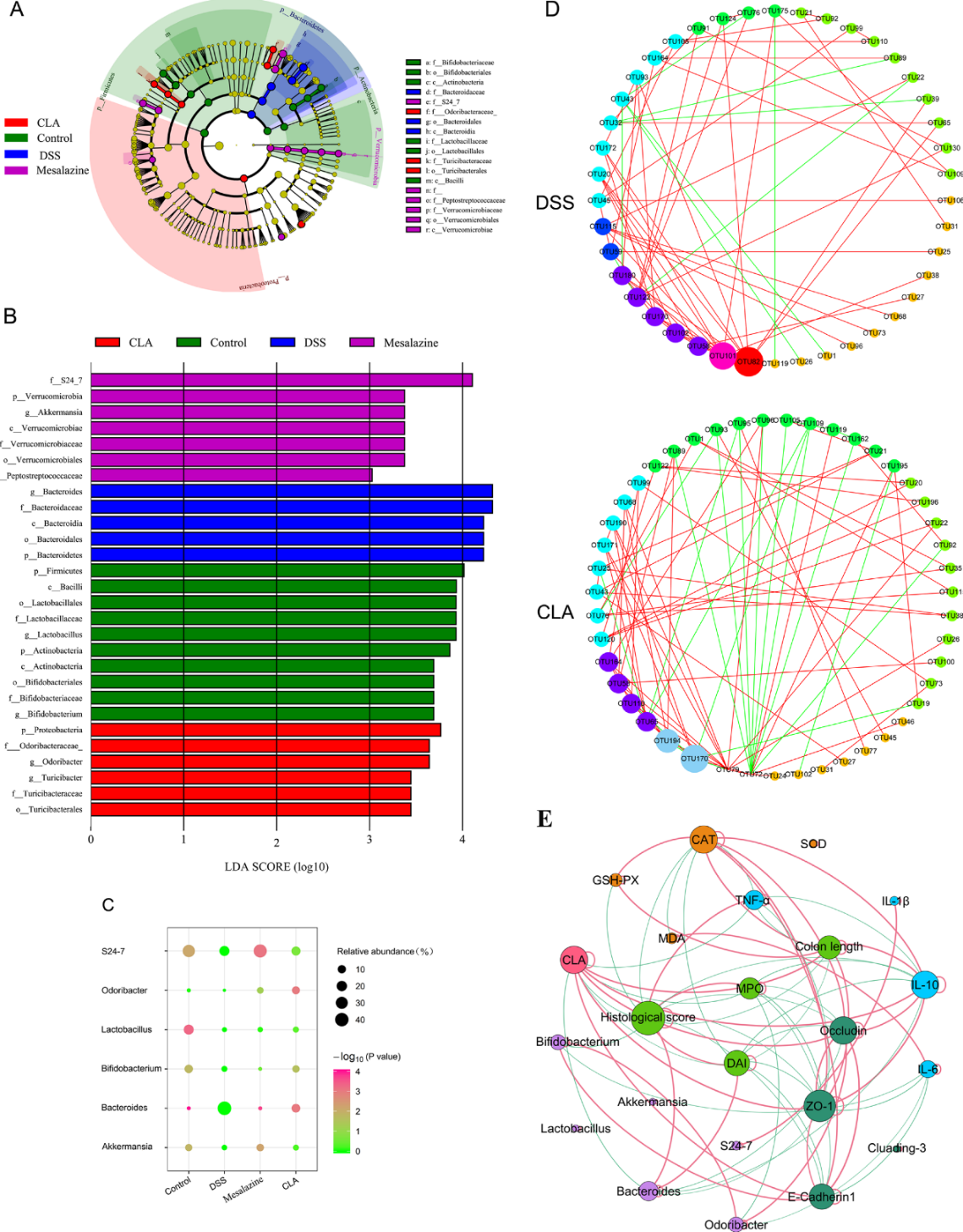Orally administered CLA ameliorates DSS-induced colitis in mice via intest inal barrier improvement, oxidative stress reduction, and inflammatory cytokine and gut microbiota modulation
Journal & Pages: Journal of Agricultural and Food Chemistry. 2019, 67(48): 13282-13298
Abstract: Dietary supplementation with conjugated linoleic acid (CLA) has been reported to alleviate the effect of colitis in mice, but the mechanisms involved need further exploration. The study aimed to investigate how orally administered CLA alleviates dextran sulfate sodium (DSS)-induced colitis in mice. CLA was administered in five different doses: 40, 20, 10, 5, and 2.5 mg/day. Doses of CLA at 10 mg/day and higher alleviated colitis symptoms and reduced inflammation induced by DSS, in which 40, 20, and 10 mg/day CLA significantly increased the concentration of mucin2 and goblet cells, but neither 5 mg/day CLA nor 2.5 mg/day CLA had any effects. Meanwhile, 40 and 20 mg/day CLA treatments significantly up-regulated the concentration of tight junction proteins (ZO-1, occludin, and claudin-3) and ameliorated epithelial apoptosis caused by DSS. Moreover, oxidative-stress-related enzymes (superoxide dismutase, glutathione peroxidase, and catalase) and inflammatory cytokines [tumor necrosis factor-α, interleukin (IL)-10, and IL-6] were modulated by 40 and 20 mg/day CLA. Furthermore, 40 mg/day CLA rebalanced the gut microbiota damaged by DSS, including reducing Bacteroides and increasing Bifidobacterium and Odoribacter. In conclusion, CLA supplementation alleviated DSS-induced colitis in a dose-dependent manner by modulating inflammatory cytokines and oxidation stress, maintaining the mucosal barrier, and reverting microbiota changes.
Figures:

【作者提要】
CLA是一种多不饱和脂肪酸,具有良好的抗炎作用。服用CLA后可改善DSS诱导的结肠炎小鼠的肠道上皮屏障,抑制上皮细胞凋亡,保护肠道粘液层,调节免疫相关细胞因子,恢复失衡的肠道菌群,缓解小鼠结肠炎症状。这种缓解作用存在明显的CLA剂量依赖关系。如何精确控制CLA的量达到即缓解结肠炎,又不会引过量服用CLA造成的副作用是之后需要研究的问题。
Authors & Affliations:
Yang Chen,†,‡ Bo Yang,*,†,‡,∥ R. Paul Ross,∥,# Yan Jin,◆ Catherine Stanton,*,∥,⊥,# Jianxin Zhao,†,‡,∥ Hao Zhang,†,‡,∥,○ and Wei Chen†,‡,§,∇
† State Key Laboratory of Food Science and Technology, ‡ School of Food Science and Technology, § National Engineering Research Center for Functional Food, and ∥International Joint Research Center for Probiotics & Gut Health, Jiangnan University, Wuxi 214122, Jiangsu, China
⊥ Teagasc Food Research Centre, Moorepark, Fermoy, Cork P61 C996, Ireland
# APC Microbiome Ireland, University College Cork, Cork T12 K8AF, Ireland
∇ Beijing Innovation Center of Food Nutrition and Human Health, Beijing Technology and Business University (BTBU), Beijing, 100048, China
○ Wuxi Translational Medicine Research Center and Jiangsu Translational Medicine Research Institute Wuxi Branch, Wuxi 214122, China
◆ Department of Gastroenterology, The Affiliated Wuxi Second People’s Hospital of Nanjing Medical University, Wuxi 214023, China
Link:https://pubs.acs.org/doi/abs/10.1021/acs.jafc.9b05744
 current location:
ICPG
>
Publications
>
Content
current location:
ICPG
>
Publications
>
Content